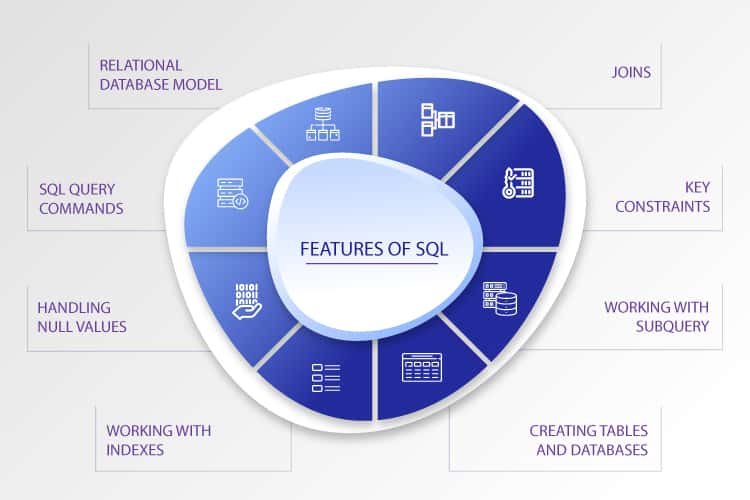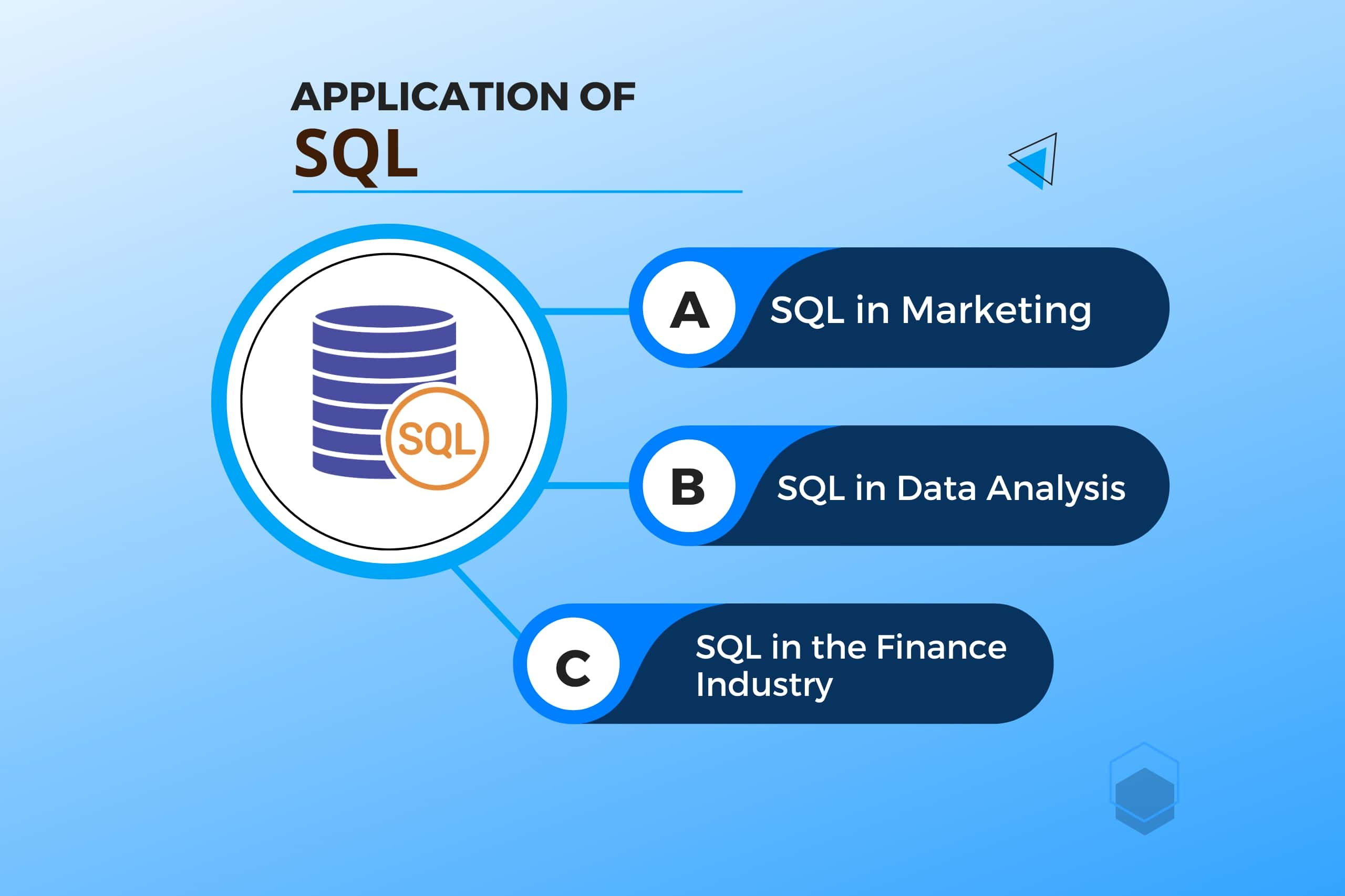One of the most demanding fields in the business world today is of Data Science. With numerous job opportunities, Data Science skills have become essential in the market. The easiest skill that a Data Science aspirant might develop is SQL. Management and storage of Data in businesses require the use of a Database Management System. Accordingly, integration of the DBMS and programming language is essential.
This blog would an introduction to SQL for Data Science which would cover important aspects of SQL, its need in Data Science, and features and applications of SQL. Additionally, you would find suggestions for different SQL certification courses to learn the programming language.
What is SQL?
The full form of SQL stands for Structured Query Language. It is a query-based language that has the sole purpose of managing relational databases. A relational database is a group of tables from where the generation of data accessing, editing and updating is viable. SQL is the standard language that relational databases uses. The use of SQL is for multiple functions like querying, inserting, updating, etc. Instances of relational databases using SQL are MySQL, Oracle, etc.
SQL is a tool that is put to use for the purpose of managing and dealing with data in the field of Data Science. Accordingly, managing data within different projects of Data Science requires SQL which is an integral part for any Data Science aspirant.
An example of how an SQL commands works is stated below:
Selecting Data: the feasibility of the SQL tool is when the selection of data from a database using the command SELECT. To ensure that it selects data from the correct table you need to add the command FROM. For instance:
SELECT *
FROM single_table
The above command denotes the selection of all the data from the table single_table to generate the required output. The * denotes that all the columns are selected from single tables. You may replace the asterisk with the names of the columns in the database and select data from multiple tables as well.
Other functions like searching on conditions, summary statistics, grouping data and joining datasets are performed using a different set of commands.
Importance of SQL in Data Science
SQL is the most in-demand skill in Data Science after Python. The importance of SQL in Data Science can be identified by its use in performing different functions for a Database. Accordingly, extraction of data, deleting, updating and modifying data in a table are essential uses of SQL. The need for SQL for a Data Scientist involves further crucial aspects which are as follows:
- SQL is important for a Data Scientist who needs to handle structured data. These structured data are present with relational databases. A Data Scientist needs to have skills in SQL to run a query on these databases.
- SQL commands are used for the manipulation of data and this SQL syntax is also used in Hive and SparkSQL.
- For creating test environments, SQL is essential as it is the standard tool for performing experiments.
- The requirement of SQL in Data Science is to conduct analytical performances on data that are stored in relational databases.
- While using Big Data Tools, Data Scientists need SQL which helps them in Data Wrangling and preparation.
Features of SQL
There are some key elements and features of SQL in Data Science that you should know as these form an important part of the programming language. These features of SQL are as follows:
- Relational Database Model
- SQL Query Commands
- Handling Null Values
- Working with Indexes
- Joins
- Key Constraints
- Working with SubQuery
- Creating Tables and Databases
Applications of SQL
As different organisations in different industries require Data Scientists, knowledge and expertise in SQL also become important. The applications of SQL in real-life situations have been given below in the fields of marketing, Data Analysis, and finance industry.
Application of SQL in Marketing
The use of SQL has the primary purpose of strategising marketing policies in businesses. Using the query language helps in effectively identifying target markets, and consumer behavior patterns and in running campaigns of marketing. There are two important activities in marketing including data availability and data processing. With the available data, it is possible to engage in running SQL queries for extracting insights that help in running marketing campaigns.
For instance, if a company launches its new skincare product for young adults who are in the age group of between 18 to 35, to understand this demography and customer location, database creation is possible. Accordingly, using appropriate queries it is possible to extract insights from this data keeping an eye on target customers. Using this dataset, it is possible for marketers to attract their target group and acquire effective results.
Application of SQL in Data Analysis
In the case of Data Analysis, SQL plays a crucial role and in real-world situations, a data analyst is able to use SQL for accessing, reading, manipulating and analyzing the data from a database. This helps an organization gain meaningful insights to derive better business decisions. The use of SQL for Data Analysis is for various purposes including running SQL queries, SQL Joins, SQL Aggregations and Views, and Stored Procedures.
- SQL Queries: In Data Analysis, SQL is used for enabling SQL Queries in five different languages. This includes- Data Definition Language, Data Manipulation Language, Data Query Language, Data Control Language and Transaction Control language.
- SQL Joins: the use of the SQL Joins in Data Analysis is to combine different tables in a database where insertion of a JOIN is possible using a Primary and a Foreign Key. Based on the type of analysis, the SQL Join is performed.
- SQL Aggregations: Considering that Data Analysis enables organisations to gain meaningful insights into data, SQL Aggregations help in this process. It engages in combining multiple entities that help in performing aggregation queries by calculating the set of values in a single entity.
- SQL Views and Stored Procedures: SQL views are refers to the virtual table’s content, the acquisition of which is possible from existing tables. It helps in optimising the databases to provide additional security to the users who have restrictions by acquiring detailed information from the database.
Application of SQL in the Finance Industry
The use of SQL by financial analysts within the finance industry including in banks and other financial institutions. Even financial analysts within business organisations make use of SQL queries to use multiple tools for financial analysis. Using relational databases, the financial analysis uses SQL to build a financial database. This use of financial databases by analysts for organising data that easily enables searching and managing data by inserting queries. This database can further hold data for making future predictions in the financial industry or even for other industries. The use of Business Intelligence Tools like PowerBI and Tableau with SQL to generate reports and visualisations. For instance, Banking institutions use SQL mainly for analysing the number of user accounts, transfers, withdrawals and deposits made and further in SQL manipulation. The use of SQL in Financial sector enables the institutions to analyse risks, detect fraudulent activities and even provide personalisation services to customers.
SQL Certification Courses
There are several topics that you might need to cover while pursuing a course in Data Science or a course in SQL certification. In order for you to know that the courses are efficient, you should assess the same focusing on whether it covers all the following topics:
- Different types of Clauses
- Aggregation Functions
- String Functions & Numeric Functions
- Date & Time Functions
- Joins
- Nested Queries
- Views & Indexing
- Temporary Tables
- Window Functions
- Common Table Expressions
- Query Optimization techniques
If you are an aspiring Data Scientist and want to develop your skills in SQL, you might enroll in different Data Science or SQL certification courses. Some of the best SQL certification courses in the market are as follows:
- Udacity’s SQL for Data Analysis: This is an online free SQL certification course that offers you an amalgamation of all the topics mentioned above. The course also houses practice quizzes after each topic to check your knowledge.
- Data Mindset by Pickl.AI: One of the best online short-term courses provided by Pickl.AI is the Data Mindset course. This course offers you a comprehensive curriculum that covers Data Analysis, the anatomy of Data and Excel. Additionally, one complete module is dedicated to SQL including all the essential topics and tools.
- Udemy’s Master SQL for Data Science: Through this course, you would learn extraction of critical data insights from data sitting in a database. It offers huge opportunities to practice SQL with the help of numerous puzzles throughout the course.
- LinkedIn Master SQL for Data Science: This course contains a total of 6 items. All of these cover the topics which are essential for you to develop your skills in SQL. Once you have covered all the topics, it includes practice sessions where you can assess your progress.
Wrapping Up!
From the above blog, it is clear that SQL is an essential part of Data Science. You need to be proficient in using SQL to run queries, deleting and organizing data and performing experiments. By following the steps to use SQL and creating databases for data analysis, you would be able to provide clear demonstrations of data to business organizations. If you want to develop your skills in using SQL and implementing SQL commands, you should take up an online course. Pickl.AI’s Data Mindset course would not only allow you to develop your skills in SQL but also help you learn Data Analysis and conduct mathematical calculations. As a Data Science aspirant, make sure to learn SQL and become an expert in Data Science.












